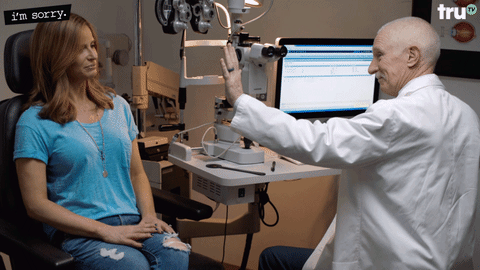Happy February! There’s so much to celebrate! Valentine’s Day, Black History Month, the Polar Vortex (brr!), and let’s not forget Macular Degeneration Awareness Month.

What is Macular Degeneration?
Age-Related Macular Degeneration, AMD, is an eye disease that causes changes to the macula (your central vision). It is the leading cause of severe blindness in people over 50. The CDC estimates that 1.8 million people have AMD, and 7.8 million more are at risk of having it.

AMD occurs in two forms. The most common type is Dry, which has no known treatment. About 80-90% of AMD patients have Dry AMD, which progresses more slowly. With Dry AMD, small deposits form on the retina beneath the macula (where sharp vision originates). These deposits gradually build up, causing deterioration to the retina, and eventual vision loss.

Wet AMD affects 10-15% of AMD patients, and causes rapid and severe vision loss. It occurs when abnormal blood vessels grow beneath the retina toward the macula. The blood vessels break, leak fluid, and bleed, damaging the macula. Unlike Dry AMD, Wet AMD can be treated with laser therapy if diagnosed early enough.

What are the Symptoms of AMD?
Similar to Glaucoma, in the beginning stages of AMD, many symptoms might go unnoticed.

Often, people report
Inability to see things clearly
Objects appear distorted
Straight lines look wavy or crooked
Loss of clear color vision
A dark or empty area in the center of vision
Central vision cannot be restored. If you experience any of these symptoms, schedule an eye exam for a comprehensive eye health check.

What causes AMD?
Smoking, high blood pressure, obesity, lack of exercising, and poor eating habits contribute to your risk of getting AMD. It’s important to maintain good overall health and visit an optometrist annually to check your vision and eye health for signs of eye disease.

Is AMD Preventable?
Like most diseases, the best way to prevent AMD is to maintain a healthy lifestyle by exercising regularly and eating well.

Eating foods with Lutein and Zeaxanthin will help promote healthy cell growth within the eyes. Taking a supplement like EyePromise may help provide added nutrients to promote healthy vision.

With AMD, vision loss is gradual at first, and may not be noticeable, so seeing an optometrist for a yearly check-up is important.

Contact us to schedule an eye exam, or book an appointment online.
Learn more about AMD online at the American Optometric Association.
.png)
Comentários